- NONFICTION BOOKS
- BEST NONFICTION 2023
- BEST NONFICTION 2024
- Historical Biographies
- The Best Memoirs and Autobiographies
- Philosophical Biographies
- World War 2
- World History
- American History
- British History
- Chinese History
- Russian History
- Ancient History (up to c. 500 AD)
- Medieval History
- Military History
- Art History
- Travel Books
- Ancient Philosophy
- Contemporary Philosophy
- Ethics & Moral Philosophy
- Great Philosophers
- Social & Political Philosophy
- Classical Studies
- New Science Books
- Maths & Statistics
- Popular Science
- Physics Books
- Climate Change Books
- How to Write
- English Grammar & Usage
- Books for Learning Languages
- Linguistics
- Political Ideologies
- Foreign Policy & International Relations
- American Politics
- British Politics
- Religious History Books
- Mental Health
- Neuroscience
- Child Psychology
- Film & Cinema
- Opera & Classical Music
- Behavioural Economics
- Development Economics
- Economic History
- Financial Crisis
- World Economies
- Investing Books
- Artificial Intelligence/AI Books
- Data Science Books
- Sex & Sexuality
- Death & Dying
- Food & Cooking
- Sports, Games & Hobbies
- FICTION BOOKS
- BEST NOVELS 2024
- BEST FICTION 2023
- New Literary Fiction
- World Literature
- Literary Criticism
- Literary Figures
- Classic English Literature
- American Literature
- Comics & Graphic Novels
- Fairy Tales & Mythology
- Historical Fiction
- Crime Novels
- Science Fiction
- Short Stories
- South Africa
- United States
- Arctic & Antarctica
- Afghanistan
- Myanmar (Formerly Burma)
- Netherlands
- Kids Recommend Books for Kids
- High School Teachers Recommendations
- Prizewinning Kids' Books
- Popular Series Books for Kids
- BEST BOOKS FOR KIDS (ALL AGES)
- Books for Toddlers and Babies
- Books for Preschoolers
- Books for Kids Age 6-8
- Books for Kids Age 9-12
- Books for Teens and Young Adults
- THE BEST SCIENCE BOOKS FOR KIDS
- BEST KIDS' BOOKS OF 2024
- BEST BOOKS FOR TEENS OF 2024
- Best Audiobooks for Kids
- Environment
- Best Books for Teens of 2024
- Best Kids' Books of 2024
- Mystery & Crime
- Travel Writing
- New History Books
- New Historical Fiction
- New Biography
- New Memoirs
- New World Literature
- New Economics Books
- New Climate Books
- New Math Books
- New Philosophy Books
- New Psychology Books
- New Physics Books
- THE BEST AUDIOBOOKS
- Actors Read Great Books
- Books Narrated by Their Authors
- Best Audiobook Thrillers
- Best History Audiobooks
- Nobel Literature Prize
- Booker Prize (fiction)
- Baillie Gifford Prize (nonfiction)
- Financial Times (nonfiction)
- Wolfson Prize (history)
- Royal Society (science)
- NBCC Awards (biography & memoir)
- Pushkin House Prize (Russia)
- Walter Scott Prize (historical fiction)
- Arthur C Clarke Prize (sci fi)
- The Hugos (sci fi & fantasy)
- Audie Awards (audiobooks)
- Wilbur Smith Prize (adventure)
Make Your Own List

Nonfiction Books » History Books » American History
The best books on the us constitution, recommended by jack rakove.

Annotated U.S. Constitution and Declaration of Independence by Jack Rakove
The Pulitzer prize-winning history professor Jack Rakove tells us how the U.S. Constitution came to be written and ratified and explains why, after more than 200 years, Americans are still so deeply wedded to it.
Interview by Eve Gerber
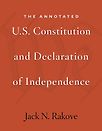
Creation of the American Republic, 1776-1787 by Gordon S. Wood
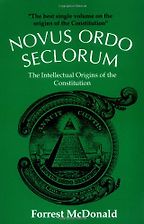
Novus Ordo Seclorum by Forrest McDonald
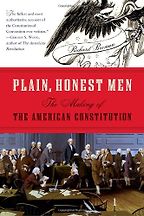
Plain, Honest Men: The Making of the American Constitution by Richard Beeman
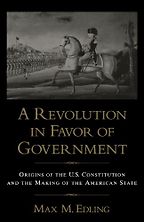
A Revolution in Favor of Government by Max M Edling
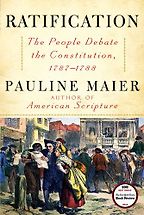
Ratification: The People Debate the Constitution, 1787-1788 by Pauline Maier
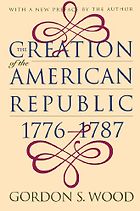
1 Creation of the American Republic, 1776-1787 by Gordon S. Wood
2 novus ordo seclorum by forrest mcdonald, 3 plain, honest men: the making of the american constitution by richard beeman, 4 a revolution in favor of government by max m edling, 5 ratification: the people debate the constitution, 1787-1788 by pauline maier.
P lease tell us about the document that preceded the Constitution.
Although the United States is a relatively young country, we have the oldest written constitution still in use. What is uniquely enduring about the document?
What’s uniquely enduring about the document is how deeply Americans are wedded to it. When Americans started writing constitutions in the 1770s, doing so was a new idea. The idea of having a written constitution as the original supreme fundamental source of law was an American invention. Now most nations around the world, with a few notable exceptions, have written constitutions.
But the United States remains uniquely wedded to our Constitution. We’re very reluctant to amend it. The idea of rethinking decisions made in 1787 scares some of us to death. So there’s a curious story: in the 1780s Americans expressed confidence in their ability to devise new institutions of government as a supreme act of political wisdom, but today we are unable to imagine how we could ever improve upon what the framers did.
Why is the history of the framing and ratification so important to everyday Americans?
Americans don’t define citizenship in terms of religion or ethnicity. Instead we define ourselves as a people who believe in the principles laid out in the Declaration of Independence and in the form of government created by the Constitution. The story of how those documents were written matters a lot to who we are as people.
The American Constitution regulates what our institutions of government can do. It forms our understanding of how the presidency, the Congress , the Supreme Court and the federal courts function in association with state and local governments. A number of legal traditions derived from English and colonial practice still shape our basic ideas of governance. But the Constitution remains the supreme fundamental source of law in the United States.
Would you make clear the relationship between the Supreme Court and the Constitution.
Article III of the Constitution gives Congress the authority to create a judiciary, but the only court the Constitution specifically created was the Supreme Court. For the last two centuries, Americans have argued a great deal about how much authority the Court has over the Constitution. In 1787, I believe, the framers of the Constitution generally assumed that the Court would have the authority to enforce constitutional norms against problematic acts of government. The Supreme Court and the federal courts created by Congress are authorised to measure acts of government against constitutional authority. That’s what we call judicial review.
Now that we’ve done the groundwork, The Creation of the American Republic tells the birth story of the Constitution. Please give us a précis.
I remind my graduate students that Gordon Wood prepared The Creation of the American Republic as his doctoral dissertation, just to scare or, hopefully, inspire them. The fact that so much research and intellectual sophistication went into a PhD thesis is one of the staggering facts of modern intellectual life.
The Creation of the American Republic established that the history of constitutional invention in America did not begin with the convention of 1787. The process of constitutional invention took off in 1776, as Americans were moving to declare independence. As the colonies became states, they had to create governments anew because their old forms of government had significant royal elements to them. So to replace colonial charters they wrote new constitutions, which said specifically what state governments could do and how they would be structured.
Wood shows that there was this rich body of experimentation going on at the level of state government. He then identifies, traces and explains all the changes – some gradual, some significant – that took place in American constitutional thinking between independence and the writing of the federal constitution. In 1786 and 1787, when it became evident that the nation needed a new federal constitution, the experience of the states provided a real source of information, arguments, experience and inspiration that the framers in Philadelphia drew on quite deeply.
What was the biggest open question left by the final draft of the Constitution?
I think the nature of the presidency was the biggest issue. There was no real model at that time, anywhere in the world, of a republican presidency. Americans were rejecting monarchy and what we now call ministerial government, meaning the cabinet form of government that was evolving in Britain. They wanted to have a president who was constitutionally independent of the legislature, but not so powerful as to be a potential despot. They didn’t know what kind of influence and authority the president would be able to acquire or need to exercise. They had no satisfactory ideas as to how the president was going to be elected, so they settled on the electoral college system. So I think the single largest issue that the framers left open was the question: “What will be the nature of executive power in a national republic?” Since then, American politics has been, in many respects, the story of the construction of presidential power.
Were there bills of rights in state constitutions?
Let’s move on to Novus Ordo Seclorum . Forrest McDonald paints a different picture of the intellectual ferment that surrounded the framing. Tell us about it.
McDonald’s book traces the different sources of intellectual influence that worked on the framers in Philadelphia. He has great background chapters where he describes dominant modes of thinking in the 18th century. He’s got a great chapter, for example, on the nature of law. He has other discussions of how people thought about political economy , meaning the role of the state in managing economic affairs. So he creates a deep intellectual background for the world that the framers inhabited. Then he assesses which authors exerted influence on particular framers. I’m not persuaded that McDonald’s method of mapping intellectual influences works as well as he thinks it does. For example, there is enormous debate about the extent of David Hume’s influence on James Madison. Scholars have been arguing about it for 70 years, but McDonald is an avowed Hamiltonian and finds it hard to take Madison too seriously.
Can we safely generalise about how Enlightenment political theory informed the framing?
Now lets talk about a 55-person portrait of the men who made the Constitution: Plain, Honest Men
by Richard Beeman.
We know a lot about the federal convention because Madison assigned himself the task of taking daily notes about what was said. And we know a fair amount about many or most of the authors of the Constitution. So we can reconstruct a narrative about how the Constitution was framed day by day, issue by issue. Rick Beeman does that very successfully.
Support Five Books
Five Books interviews are expensive to produce. If you're enjoying this interview, please support us by donating a small amount .
Framing a constitution through this kind of convention was a great novelty. Most of the state constitutions, which had been done a decade earlier, were written quickly by delegates who had other duties to perform. Delegates to the Constitutional Convention came to Philadelphia from 12 of the 13 original states and sat together, sealed up in Independence Hall, from May through September. Some of the delegates spoke very little, about 15 were active speakers, others sat back and absorbed or seemed terribly bored. They came in good moods and bad. Some ate too much for lunch and napped in the afternoon. It got pretty hot in the hall. Reconstructing what it was like, week by week, to draft a new federal plan makes a great story.
It seems that two centuries ago the framers were unable to resolve contentious issues that are still being litigated today – disagreements over guns, freedom of speech, separation of church and state. What is the Constitution’s legacy on those issues?
Next, A Revolution in Favor of Government revises our understanding of the Constitution. How?
Max Edling, a young Swedish scholar, who has just finished a sabbatical at Stanford this year, did this book originally as a doctoral dissertation in England. For a foreign scholar to write a thesis that significantly shifts how established scholars think about the American Constitution is quite a feat.
Max Edling restores the Hamiltonian part of the framing story. Most scholars, myself included, have privileged James Madison, who was most concerned about the protection of rights and the proper structure of constitutional government. Edling explains that Alexander Hamilton and a group of other men who had served in the Continental Army, were concerned by the weakness that the American government demonstrated during the revolutionary war and were deeply aware that Great Britain, our former colonial master, was advantaged by having the most efficient state in the Atlantic world. Their view of the dangers that the United States would face as a new republic shaped the framing.
Gordon Wood wrote of this book: “It helps us better understand the constitutional sources of the gigantic fiscal-military state that the United States has become.” What does Wood mean?
Pauline Maier picks up the story of the Constitution from the time of its framing with Ratification . Please tell us about it.
The story of how the Constitution was ratified is just as remarkable as the story of how it was framed. By the end of 10 months of public debate, each of the 11 states that originally ratified the Constitution had independently adopted it. States could recommend amendments, but the only binding action they could take was to vote the entire Constitution up or down. Comparing that process to what Europeans have been going through over the last decade with the EU constitutional treaty makes you think the framers were geniuses. They came up with a remarkably efficient way to get the Constitution adopted. It required a lot of debate and a lot of political manoeuvring but it was ratified in less than a year.
Until Pauline Maier published this book, that story has never been well told. There have been examinations of particular state debates. There was one older narrative, which was adequate. But no one has looked at ratification as comprehensively. Recently, the Historical Society of Wisconsin compiled some 20 volumes of ratification debate records. Maier uses those records cohesively and effectively. She tells a great story.
How did the Federalists win the day?
They won the day in various ways. Under the Articles of Confederation you needed all 13 states to approve amendments. The framers of the Constitution said, “We’re only going to require the approval of nine states to replace the Articles.” Since state legislatures might lose power under the new Constitution, the ratification went through constitutional conventions rather than legislatures. It was a gimmick that worked.
Ratification got off to a good start. The Federalists got six states to ratify within the first few months of debate. They made one big mistake in Pennsylvania, which was the second most populous state at the time. The Pennsylvania convention was divided into two parties: two-thirds of the members were Federalists who supported ratification; another third were anti-Federalists who opposed it. The Federalist majority rode roughshod over the anti-Federalist minority. That played poorly in the press – it looked as if the Federalists were being overly manipulative and insufficiently democratic. Criticism of what took place in Pennsylvania helped make the overall process of ratification elsewhere fairer.
Furthermore, Federalists didn’t control all the press but they did dominate it. They got George Washington and Benjamin Franklin on their side. They capitalised on the prevailing sense that the Articles of Confederation, which came into effect towards the end of the Revolutionary War, were riddled with problems. Whatever controversy there might be about particular provisions of the federal constitution, it seemed more promising than the Articles.
Maier walks us through the debates, one by one, so we understand how the politics of ratification played out within individual states. If you read Maier, you get to see the complexities of what happens when citizens are given the opportunity to discuss their national constitution.
In the two centuries since ratification, the Constitution has often been interpreted in light of the ratification debate records. Do you think that’s historically sound?
Most historians are very sceptical about the way that the Supreme Court is doing this. To reason accurately about the past is much trickier than one might think. The current version of originalism is what’s called “public meaning originalism”. It says we don’t really care about the history of how these provisions got adopted, we’re not going to try to reconstruct the debates to figure out what the framers wanted and what the ratifiers thought. We just want to get at the holistic meaning of the language. To historians this is a terribly flawed enterprise, but that’s the current regime.
Can you explain why that enterprise is so wrongheaded?
Language is dynamic. As the work of many historians, including my own work, attests, the 18th century was a period of political experimentation. The framers were rethinking the nature of representative government, they were rethinking the nature of executive power, they were coming up with new rules for judges. All this required a terrific amount of creative political thinking. The idea that language was fixed when all these ideas were being stretched and pressed in different directions, the idea that the meaning of a text is frozen at the moment of its adoption, it just strikes most historians as inane.
What can we learn about interpreting the Constitution by reading your Pulitzer-winning history of the framing, Original Meanings ?
The best way to reconstruct the original meaning of documents that we still interpret today is to come up with a method of analysis that looks very carefully at different sources and how much those sources are worth. The framing debates involved a relatively small group of men deliberating on a day-to-day basis. Once the Constitution was published, anybody could say anything about it. The ratification debate was just as wide open as our own political debate, quite different from the closed-door debates that occurred within
In my book I spend a lot of time distinguishing the original intentions of the framers from the original understandings of the ratifiers. I try to explain why any intelligent analysis of the Constitution’s original meaning would have to look at both and think critically about each form of evidence. I try to give the historian’s answer to the lawyer’s question.
You’ve said that historians should call the bluff of people who twist the history of the Constitution for instrumental purposes. Please call someone’s bluff.
I submitted a brief in the District of Columbia vs Heller case, from three years ago. That was the case in which the Court struck down a 32-year-old handgun ban as incompatible with the Second Amendment. I think there are intellectual embarrassments of the first order in Justice Scalia’s opinion. He wholly ignores the history of how the Second Amendment got adopted. He makes things up that did not happen the way he hypothesises. But I’m a historian and he’s a justice . I’m a private citizen and he’s a public official. I think I have better footnotes, but he has a vote on the Supreme Court.
November 5, 2012
Five Books aims to keep its book recommendations and interviews up to date. If you are the interviewee and would like to update your choice of books (or even just what you say about them) please email us at [email protected]
Jack Rakove
Jack Rakove teaches history and political science at Stanford University. He is the author of six books on early American history. He won a Pulitzer prize in 1997 for his book Original Meanings
We ask experts to recommend the five best books in their subject and explain their selection in an interview.
This site has an archive of more than one thousand seven hundred interviews, or eight thousand book recommendations. We publish at least two new interviews per week.
Five Books participates in the Amazon Associate program and earns money from qualifying purchases.
© Five Books 2024

Fulfillment by Amazon (FBA) is a service we offer sellers that lets them store their products in Amazon's fulfillment centers, and we directly pack, ship, and provide customer service for these products. Something we hope you'll especially enjoy: FBA items qualify for FREE Shipping and Amazon Prime.
If you're a seller, Fulfillment by Amazon can help you grow your business. Learn more about the program.

Download the free Kindle app and start reading Kindle books instantly on your smartphone, tablet, or computer - no Kindle device required .
Read instantly on your browser with Kindle for Web.
Using your mobile phone camera - scan the code below and download the Kindle app.

Image Unavailable

- To view this video download Flash Player
Follow the author

The Everything U.S. Constitution Book: An easy-to-understand explanation of the foundation of American government (Everything® Series) Paperback – June 18, 2011
- How the articles and amendments were drafted
- Insight into the intentions of the creators and the sources they used
- Controversial interpretations and Supreme Court decisions
- How the Constitution affects citizens every day
- The Declaration of Independence, the Articles of Confederation, and unratified Constitutional amendments This book walks you through the history of this essential document and shows how it has guided lawmakers and judges for more than 200 years. This unbiased look at the Constitution will help you feel confident in your knowledge of this all-important document, gain a firmer understanding of how our government works, and put context around today's most pressing issues.
- Print length 304 pages
- Language English
- Publisher Everything
- Publication date June 18, 2011
- Dimensions 8.25 x 0.2 x 11 inches
- ISBN-10 1440512744
- ISBN-13 978-1440512742
- See all details


Customers who viewed this item also viewed

Editorial Reviews
From the author, about the author, product details.
- Publisher : Everything (June 18, 2011)
- Language : English
- Paperback : 304 pages
- ISBN-10 : 1440512744
- ISBN-13 : 978-1440512742
- Item Weight : 1.2 pounds
- Dimensions : 8.25 x 0.2 x 11 inches
- #752 in Constitutions (Books)
- #3,430 in U.S. Revolution & Founding History
- #6,742 in U.S. Political Science
About the author
Ellen m. kozak.
Ellen M. Kozak practices copyright, publishing, and media law in Milwaukee, Wisconsin. She is the author of nine books (some of them novels published under a pseudonym) and hundreds of articles that have appeared in publications as diverse as "USA Today," the "Wall Street Journal," "Campaigns & Elections," "Travel+Leisure," "Milwaukee Magazine," the "Milwaukee Journal Sentinel," "Toastmaster," and the "Fresno Bee," as well as radio essays for WUWM radio.
Ms. Kozak is a frequent speaker on legal topics and on publishing and copyright law to groups around the country. She is a graduate of Barnard College and the University of Wisconsin Law School, and holds a Certificate in Law of the Media from the NYU School of Law.
Her book "From Pen to Print: The Secrets of Getting Published Successfully" was named best Wisconsin nonfiction book of 1990 by the Council for Wisconsin Writers.
Customer reviews
- 5 star 4 star 3 star 2 star 1 star 5 star 79% 13% 7% 0% 2% 79%
- 5 star 4 star 3 star 2 star 1 star 4 star 79% 13% 7% 0% 2% 13%
- 5 star 4 star 3 star 2 star 1 star 3 star 79% 13% 7% 0% 2% 7%
- 5 star 4 star 3 star 2 star 1 star 2 star 79% 13% 7% 0% 2% 0%
- 5 star 4 star 3 star 2 star 1 star 1 star 79% 13% 7% 0% 2% 2%
Customer Reviews, including Product Star Ratings help customers to learn more about the product and decide whether it is the right product for them.
To calculate the overall star rating and percentage breakdown by star, we don’t use a simple average. Instead, our system considers things like how recent a review is and if the reviewer bought the item on Amazon. It also analyzed reviews to verify trustworthiness.
Review this product
Top reviews from the united states, there was a problem filtering reviews right now. please try again later..
5.0 out of 5 stars Priced better than Retail =D
5.0 out of 5 stars This book comes in handy, I live in the ...
5.0 out of 5 stars delivered as promised.
4.0 out of 5 stars Easy to understand
5.0 out of 5 stars the title of the book says it all.
1.0 out of 5 stars Historically inaccurate, procedurally ignorant...
- Amazon Newsletter
- About Amazon
- Accessibility
- Sustainability
- Press Center
- Investor Relations
- Amazon Devices
- Amazon Science
- Sell on Amazon
- Sell apps on Amazon
- Supply to Amazon
- Protect & Build Your Brand
- Become an Affiliate
- Become a Delivery Driver
- Start a Package Delivery Business
- Advertise Your Products
- Self-Publish with Us
- Become an Amazon Hub Partner
- › See More Ways to Make Money
- Amazon Visa
- Amazon Store Card
- Amazon Secured Card
- Amazon Business Card
- Shop with Points
- Credit Card Marketplace
- Reload Your Balance
- Amazon Currency Converter
- Your Account
- Your Orders
- Shipping Rates & Policies
- Amazon Prime
- Returns & Replacements
- Manage Your Content and Devices
- Recalls and Product Safety Alerts
- Registry & Gift List
- Conditions of Use
- Privacy Notice
- Consumer Health Data Privacy Disclosure
- Your Ads Privacy Choices
5 Great Books about the Constitution
- September 17, 2014
On this day 227 years ago, the delegates to the Constitutional Convention released the text of a new charter of government. They had wrangled since late May, through a sweltering summer, to produce a document that carried deep flaws and great virtues. To mark Constitution Day, we offer a list of five great books about America’s seminal manuscript.

- American Epic: Reading the U.S. Constitution by Garrett Epps (Oxford) . Taking the Constitution on its own terms, Epps leads a fascinating literary exploration of the 7,500 words of the document itself.
- The Summer of 1787: The Men Who Invented the Constitution by David O. Stewart (Simon & Schuster) . This book offers a compelling narrative of the brilliant though sometimes angry and scheming personalities who produced the world’s first written charter for a republic.
- The Federalist Papers by Alexander Hamilton, James Madison, and John Jay (various) . First published as newspaper advocacy pieces, these 85 essays on the new American government have never been surpassed.
- Ratification: The People Debate the Constitution, 1787-1788 by Pauline Maier (Simon & Schuster) . Once the Constitution was written, the states still had to ratify it, which proved to be a difficult, dramatic, and enlightening process.
- James Madison and the Struggle for the Bill of Rights by Richard Labunski (Oxford) . The Framers of the Constitution forgot to include most protections for individual rights, so Madison and the First Congress undertook that essential effort in 1789.
What are your favorite books about the Constitution, the Founding Fathers, or any other aspect of America’s birth? Tell us about them in the comments section below!
Feature in Beyond The Book More
Bedtime Stories, March 2014

What do literary types have queued up on their nightstands and ready to read before lights-out? We asked a few of them, and here’s what they said.
A Patriotic Pick: April 2023

Enjoy this Grateful American™ reading recommendation!

IMAGES
COMMENTS
What’s uniquely enduring about the document is how deeply Americans are wedded to it. When Americans started writing constitutions in the 1770s, doing so was a new idea. The idea of having a written constitution as the original supreme fundamental source of law was an American invention.
Jan 18, 2021 · American Epic: Reading the U.S. Constitution by Garrett Epps (Oxford University Press). Taking the Constitution on its own terms, the author leads a fascinating literary exploration of the 7,500 words of the document itself. The Summer of 1787: The Men Who Invented the Constitution by David O. Stewart (Simon & Schuster). This book offers a ...
Jun 25, 2019 · I think Wehle must use this book for her classes. Wehle goes through the Constitution explaining the meaning or at least what the Supreme Court has ruled. The author also covers laws, etc., that are based on common values, morals and so forth. The book is well written and easy to understand. The author covers items from Washington to Trump.
Jun 14, 2022 · He is an author, co-author, or co-editor of more than 40 books, including Visible Ink Press’s The Handy Law Answer Book, The Handy Supreme Court Answer Book, and The Handy American History Answer Book, as well as Let The Students Speak: A History of the Fight for Free Expression in American Schools and The Encyclopedia of the First Amendment ...
Jun 18, 2011 · But do you know what the U.S. Constitution actually says? This accessible guide contains the complete text of the Constitution, with short, descriptive margin notes throughout. Articles and amendments are then analyzed in depth to help you comprehend the basis of democracy. This valuable handbook covers: How the articles and amendments were drafted
Sep 17, 2014 · American Epic: Reading the U.S. Constitution by Garrett Epps (Oxford). Taking the Constitution on its own terms, Epps leads a fascinating literary exploration of the 7,500 words of the document itself. The Summer of 1787: The Men Who Invented the Constitution by David O. Stewart (Simon & Schuster). This book offers a compelling narrative of the ...